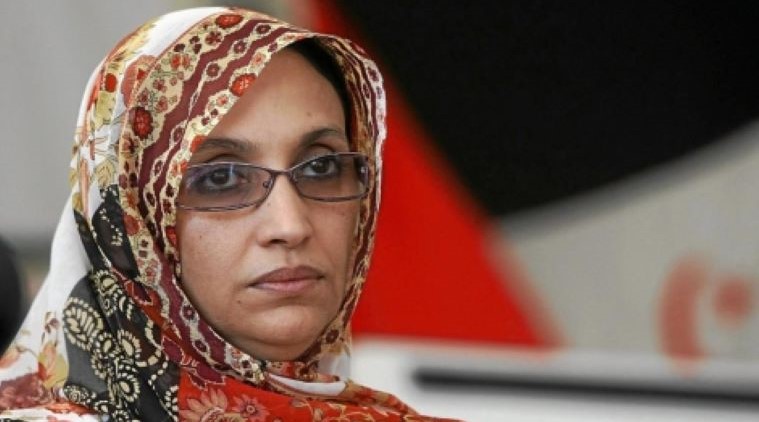Eduardo González
The Government has assured, without adding more details, that “the file” related to the residence permit of the Sahrawi activist Aminatu Haidar “is resolved and is waiting for the applicant to continue with her application.”
Last December, Haminatu Haidar denounced that the Government of Pedro Sánchez had denied the renewal of her residence permit. The news was confirmed around the same time by her lawyer, who declared to the newspaper El País that the Executive’s decision was “political” and that “Aminatu is one more victim of the aggressiveness and administrative violence of this Government towards the Sahrawi population.”
Haidar, who received a humanitarian visa in Spain 16 years ago to receive medical treatment for his multiple health problems, had renewed his permit each year until 2020, but was denied an extension in 2021 due to staying too long outside Spain. The activist appealed the decision, which allowed her to keep her permit.
After her permit expired in January 2022, Haidar requested the extension within the 90-day period. Additionally, in May of that year she requested that her file be transferred to Madrid to receive medical treatment. However, the Government Delegation in Madrid notified her, a year later, of the denial of her residence permit, arguing that the application had been submitted after the deadline. As a consequence, the activist has been in an irregular situation in Spain since November, fearing possible deportation to Western Sahara.
The activist, suffering from fibromyalgia, chronic osteoporosis and previous surgeries, was sentenced to prison in 2005 for her activities in favor of the independence of Western Sahara and carried out a 32-day hunger strike in 2009 at the Lanzarote airport, where she had been expelled by the Moroccan authorities from Laayoune upon arrival from a trip to the United States. During the hunger strike, Agustín Santos Maraver, current deputy for Sumar, went to Lanzarote to meet with her while he was serving as chief of staff of the then Minister of Foreign Affairs, Miguel Ángel Moratinos.
The new situation of Aminatu Haidar has generated quite a repercussion in Spain, which has resulted in four written parliamentary questions from the PP, the Sumar Group (to which the second vice president, Yolanda Díaz, belongs), EH Bildu and the Bloque Nacionalista Galego, on behalf of the Joint Group.
Specifically, PP recalled on December 27 that both Haidar and the lawyer had denounced that the denial of the permit was a “political decision” and had announced their intention to appeal “through judicial means” and asked the Government about its information on the situation of the activist.
For his part, Sumar recalled that Haidar’s medical circumstances are “the same as 16 years ago” and, therefore, he should continue to benefit from the residence authorization for humanitarian reasons, provided by law for foreigners who can prove a serious illness. Serious event requiring specialized healthcare. In addition, Sumar related this decision to the pressure exerted by Morocco against Spain after the entry into Zaragoza of the leader of the Polisario Front, Brahim Ghali, to receive medical treatment (which triggered a serious diplomatic crisis that was only resolved with Pedro Sánchez’s decision to recognize the Moroccan autonomy plan for Western Sahara) and with the denials of nationality requested by the Sahrawi population in Spain.
EH Bildu asked the Executive what was the Government’s reason for denying the residence permit to Aminetu Haidar “taking into account that he had had this temporary permit for health reasons for 16 years”, and the Bloque recalled that the decision on Haidar was occurred “after the change in the Government’s position regarding the Sahara, to support or accept as valid the proposals of the Kingdom of Morocco to solve the conflict.”
In its response to PP, Sumar and EH Bildu, registered on February 23, the Executive has limited itself to ensuring, without further details, that “the file is resolved and is waiting for the applicant to continue with her application.” Regarding the Bloque’s question, the Government has limited itself to recalling Spain’s support for “a mutually acceptable political solution within the framework of the United Nations Charter and in the resolutions of the Security Council” and for “the work of the United Nations Mission for the Referendum in the Western Sahara (MINURSO) and the Special Envoy of the Secretary General of the United Nations.”







